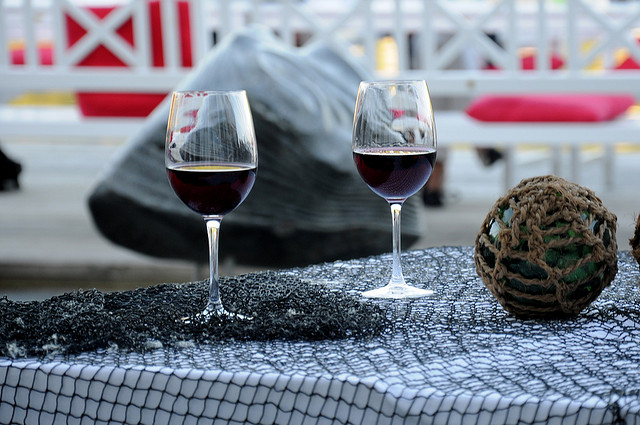On a perfect day, I’ve spent the morning writing quietly at my desk, passed a leisurely hour or two outdoors walking in nature, and as evening falls, I’m in the kitchen, some nice music playing and a glass of wine in hand, making supper with fresh, gorgeous ingredients.
As a French-trained chef, I’m very fond of a glass of good wine at dinner.
Having resided many years in southern Europe where wine is akin to religion (think France, Italy, Spain), dinner is simply not complete without a glass of vino. (You used to be able to say the same thing about lunch, but times are changing.)
So it was with huge reluctance—sadness even—that I recently gave up this lovely, timeless and deeply cultural beverage.
In general, I’m a very healthy guy. For 20 years, I’ve been interested in nutrition and “alternative nutrition” (Ayurveda, macrobiotic, 5 Element, etc.) since long before my classical culinary training.
I’ve also struggled with some severe blood sugar issues for most of my adult life.
About a decade ago, I was 100 percent “raw”—a diet entirely of uncooked and living foods—and I lived that way for two years.
When I first went raw, I experimented for two months with an extreme, hard-core low glycemic diet. The results were dramatic: I dropped 20 pounds, my headaches disappeared, I had abundant energy and my eyes and skin positively glowed with health and vitality.
Eventually, I moved away from being entirely raw, but I’d learned something very important about sugars.
It was during my raw phase that I embraced agave nectar. It is hugely popular as a sweetener among the raw crowd, with many desserts depending heavily upon it. Despite that, it is highly refined; for a long time I believed the claims that it was a low-glycemic sweetener, though my own body would get a bit wobbly if I had too much of it.
Being off traditional sugar and watching my simple carbohydrates like a hawk, I felt good most of the time. Less shaky. Less foggy. Less tired and weak. Less irritable.
Fairly recently, I let go of agave as well, experimenting with xylitol (made from birch trees) and erythritol, a simple fruit sugar. And while they’re okay, both seem to bother my digestion if I eat too much of them (though supposedly they won’t cause that effect). Stevia seems to be the best and most natural, but I just can’t get past its aftertaste and it doesn’t really appeal to me.
As my tastebuds grew less dulled by the sweet taste, I found that I needed—wanted—less of it. When at a party or out to dinner and a friend or my mate would convince me to taste a bite of some amazing dessert, it would taste cloyingly sweet to me. (Which helps save me from wanting and eating it, thankfully.)
About two years ago, I gave up wheat, too. To some, my approach to eating might sound fairly limited and dire; I can only say that as a trained chef I’m extremely adept in the kitchen, and I’m willing to spend a good deal of time and effort to make something delicious.
Even with my healthy diet, the one thing I clung to was wine.
A well-crafted vintage, served in a nice glass, is for me the perfect accompaniment to a meal. Wine is complex and intriguing; it is sensory and sensual. It’s like a new lover each night (and some are decidedly better than others).
And while I felt good overall, I didn’t feel great.
Often I would wake in the night with a flutter behind my eyes—for me a sign of wobbly insulin levels. Drinking more than a single glass of wine meant that I felt tired and sluggish by midday, and if I’d “slipped” with sugar somehow (or more than a glass of wine) I experienced what I’ve come to term as a “sugar hangover”—a vaguely nauseous and dizzy feeling.
I had already realized that if I consumed wine with a meal based on protein (say a roasted chicken), it moderated the residual sugar level of the wine somewhat. Whereas if my dinner was vegetarian (as it is most nights), I felt decidedly more wobbly the next day. I also fared better when I stayed away from whites with a high residual sugar, like Riesling (much as I adore a good German or Alsatian). I also recognized that on nights when, for some reason, I didn’t have a glass of wine, I felt better the next morning.
Wine, along with pairing it with food, has been such a profound pleasure for me. I have savored and studied it, attending weekly tasting classes for a couple of years. At one point while living in London, I hovered on the point of setting upon the rigorous path to become a sommelier.
All this to say that the thought of letting go of wine was pretty bleak.
But what is the price of health and feeling vibrant? I want to do more than simply exist and feel “pretty good”—I want to thrive.
The first two evenings without wine, it felt like something essential was missing. (It was, actually.) Quietly in mourning and longing for a nice bottle to open, I felt my dinner was somehow flat.
I’ve never been compelled to have more than a glass or two, so I was surprised to find myself actually craving one; I nearly got in the car and drove down the local wine shop. Sure, there is the alcohol component, but the sugar itself is addictive. I know, because I felt the same way with getting off refined sugar years ago (and somewhat similarly when giving up wheat).
In an “aha” moment, I realized that the residual sugars in the wine I was consuming each night was my body’s only real “fix”—like the smoker who has “quit” but still has one cigarette at night. As long as I was still drinking wine, my diet wasn’t really low glycemic.
That first evening sans vin, I slept through the night without any blood sugar flutters. In the morning I felt stable, rather than wobbly and in immediate need of food. On the second evening at dinner, I still definitely missed the wine but I wasn’t craving it.
As the days progressed, I felt undeniably good. With all refined sugar now essentially removed from my daily intake, I was light, clear, energized and stable. My eyes became brighter and whiter. Even my partner commented.
Admittedly, I’m envious of those whose bodies can tolerate what mine doesn’t seem to be able, and I’m still disappointed that I had to break up with wine. It was such a lovely little ritual and pleasure (going back to that ‘”over” analogy).
These days, several months after walking away, it’s only a very occasional embrace.
I miss you, my dear wine, but I’m better without you.
Cheers.
~
Relephant Read:
Wine Recommendations we actually Understand. {Hilarious Photos}
~
Author: L.R. Heartsong
Editor: Toby Israel
Photo: L.C. Nøttaasen/Flickr // Martha Jimenez/Flickr
~









Read 6 comments and reply